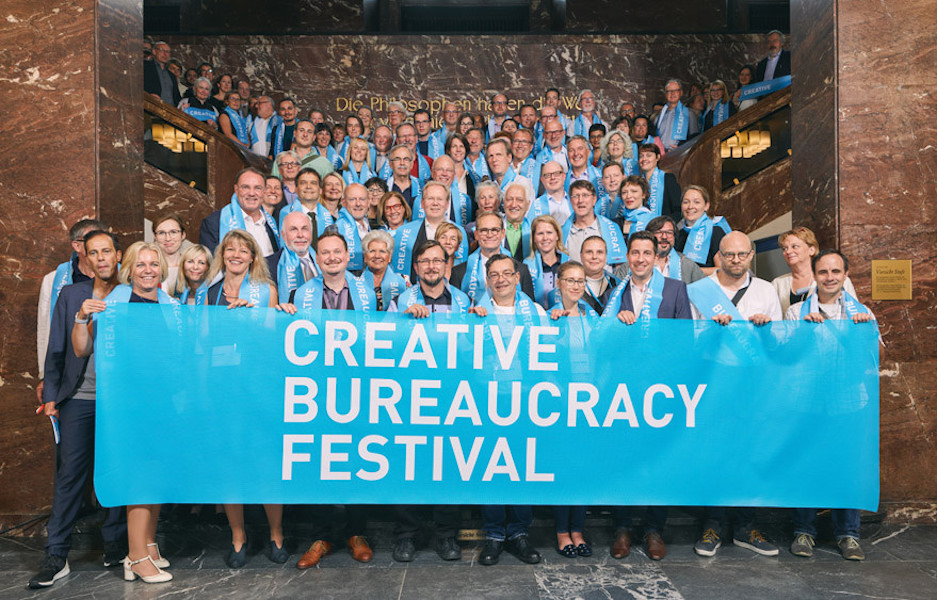By Charles Landry
‘Creativity’ and ‘bureaucracy’ are two words apparently in tension. The creative bureaucracy concept seeks to marry these two seemingly incompatible ideas. Mixing them creates a jolt; it makes people think. Why? Because creativity focuses on resourcefulness, imagination, responsiveness, adaptability and flexibility.
But say the word ‘bureaucracy’ to yourself. What does it conjure up? Mindless rules, lazy complacency, incomprehensible forms, red tape, inefficient, convoluted, overpaid, wasting resources. The ‘creative bureaucracy’ concept challenges this simplistic thinking. It argues that there is talent to be unleashed in public administrations if one could move from a ‘no, because’ culture to a ‘yes, if’ culture and linked structure.
A movement is emerging to rethink our public administrations, and the Robert Bosch Stiftung and the Actors of Urban Change programme are playing their part. The Actors initiative itself seeks to encourage new ways of thinking, working and acting by fostering cross-sector links across the public, private and civic domains and to embed these in how projects and ideally the city as a whole operate.
This responds to the recognition at Actors of Urban Change that we are in the midst of redesigning the world and all its systems for 21st century conditions. Its overarching principle is that the market alone cannot hope to meet complex social, economic and cultural objectives, and so we need to bend the market to bigger picture purposes through an innovative regulatory and incentives regime.
This needs a bureaucracy that can draw on all its ethical, creative and intellectual resources and reclaim a distinctive leadership role, but framed in a 21st century context.
Increasingly, it is accepted that complex problems or deeper trends, areas we expect bureaucracies to lead on, will demand new ways of thinking and problem solving, and especially the ability to partner and to connect across public, private and community divides.

The core areas bureaucracies need to rethink are threefold. First, the regulatory and incentives system; second, the inner life of the bureaucracy, where according to our research the discretionary effort – that is the effort given freely – is minus 35%, because of the cultures and structures of traditional bureaucracies; and lastly, right at the heart of Actors of Urban Change’s concerns, how civic movements can have a new relationship with public authorities through co-shaping and co-creating their evolving city.
City making at its best is a joint endeavour where citizens feel they are real shapers and makers.
Here, the Actors programme plays an important role especially with its focus on citizen involvement, where we see its focus on citizens as city makers. Pressure from below is expressing itself in many forms — from the urban commons movement to activist groups responding to the decline in trust both of authorities and between elites and citizens, which many commentators credit with the rise in populism.
This embodies the notion of the participative imperative and agendas related to ‘the right to and responsibility for the city’ movements. City making at its best is a joint endeavour where citizens feel they are real shapers and makers. This is part of a wider movement — think here of initiatives, such as Amsterdam’s We Make the City or New Cities’ Crowdsourcing the City programme or reSITE in Prague. These all encapsulate the raft of ideas and initiatives concerned with civic engagement and rethinking the relationship between city and citizen, as well as many other democratic processes. This trend reinforces the need for city governments to strengthen even more their role as enablers and facilitators.
There is a massive, urgent task ahead for bureaucracies to help create a fairer, more equal world — but in the context of a converging, escalating crisis across the globe. Our societies are increasingly unequal. The population is ageing and they have fewer resources to respond to the growing need for care services. Demands for affordable living conditions are increasing and negative gentrification processes are rising. Public space is under threat and often privatised. Frenzied finance movements are rattling domestic economies. Mass migration is engendering fear and uncertainty. And, overlaying everything, our digitising world and its disruptive technologies are providing both vast opportunities and threats. This cannot be adequately addressed if part of the system is uncreative.
***
Charles Landry is a Robert Bosch Academy Fellow and a member of the Jury for the Actors of Urban Change program. He co-founded and co-hosted the Creative Bureaucracy Festival, which gathered over a thousand creative bureaucrats in Berlin in September 2018. The second edition of the festival will once again take place in Berlin from 20 to 22 September 2019.
